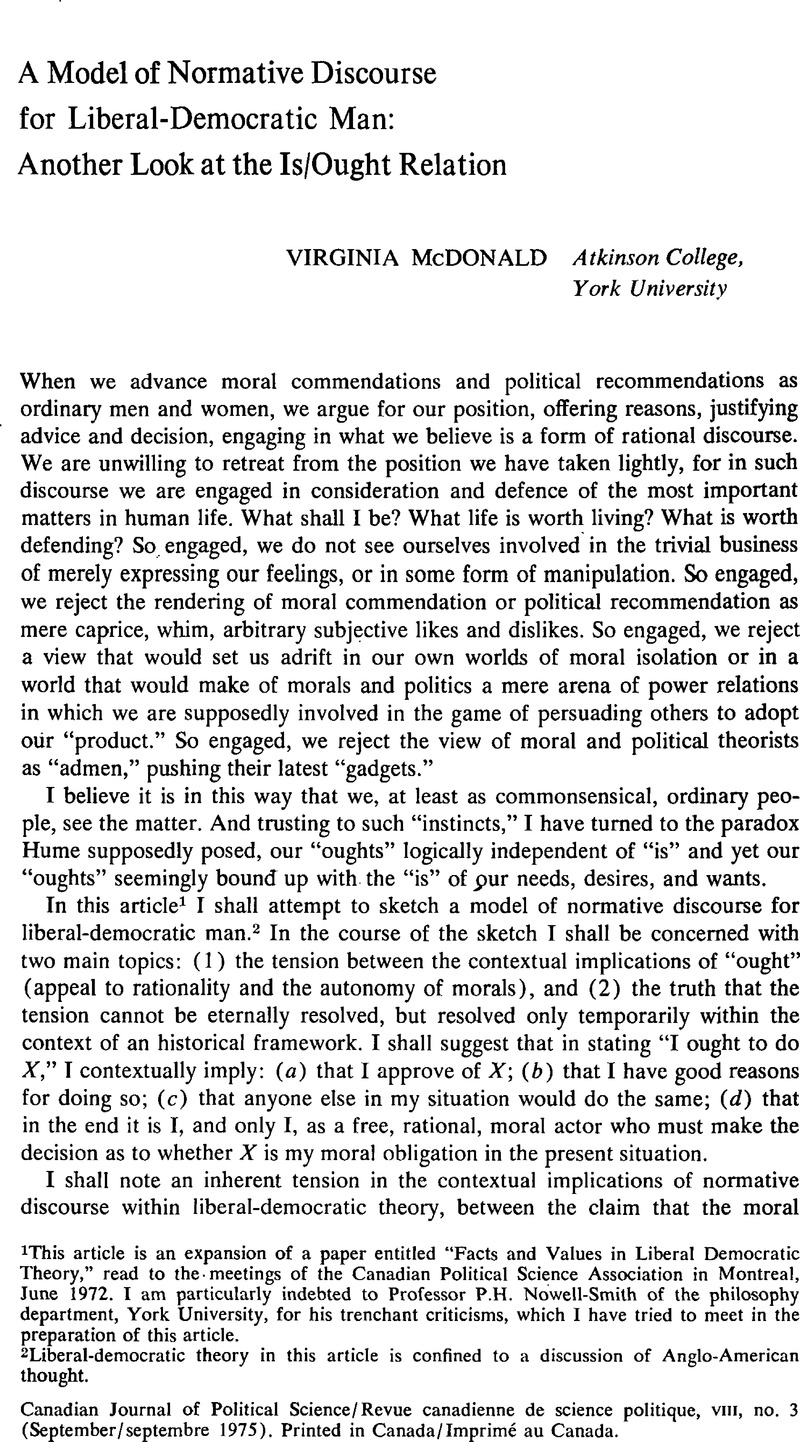Article contents
A Model of Normative Discourse for Liberal-Democratic Man: Another Look at the Is/Ought Relation
Published online by Cambridge University Press: 10 November 2009
Abstract

- Type
- Articles
- Information
- Canadian Journal of Political Science/Revue canadienne de science politique , Volume 8 , Issue 3 , September 1975 , pp. 381 - 402
- Copyright
- Copyright © Canadian Political Science Association (l'Association canadienne de science politique) and/et la Société québécoise de science politique 1975
References
1 This article is an expansion of a paper entitled “Facts and Values in Liberal Democratic Theory,” read to the meetings of the Canadian Political Science Association in Montreal, June 1972. I am particularly indebted to Professor P.H. Nowell-Smith of the philosophy department, York University, for his trenchant criticisms, which I have tried to meet in the preparation of this article.
2 Liberal-democratic theory in this article is confined to a discussion of Anglo-American thought.
3 The Concept of Law (4th ed. Oxford 1967), 189
4 I am indebted to Professor P.H. Nowell-Smith for my emphasis on the contextual implications of normative discourse. See his Ethics (London 1954).
5 A Treatise of Human Nature, ed. Selby-Bigge, L.A. (1888; reprinted Oxford 1960), 469–70Google Scholar
6 Ibid., 472
7 See in particular Macintyre, A., “Hume on ‘Is’ and ‘Ought,’” in Hume: a Collection of Critical Essays, ed. Chappel, V.C. (New York 1966), 240–64.CrossRefGoogle Scholar
8 Hume, Treatise, 472
9 The following necessarily abbreviated account of twentieth-century moral philosophy sums up my assessment of the field as a result of a number of years’ study of moral philosophy in the philosophy department at the University of Birmingham and in the Faculty of Moral Sciences, Cambridge University. The assessment is based on the works of, among others: Ayer, A.J., Language, Truth and Logic (New York 1952)Google Scholar; Corbett, P., Ideologies (London 1965)Google Scholar; Hare, R.M., The Language of Morals (New York 1964)Google Scholar; Freedom and Reason (Oxford 1963); MacIntyre, A., A Short History of Ethics: a History of Moral Philosophy from the Homeric Age to the Twentieth Century (New York 1966)CrossRefGoogle Scholar; Nowell-Smith, Ethics; Thorson, T.L., The Logic of Democracy (New York 1962)Google Scholar; Toulmin, S., An Examination of the Place of Reason in Ethics (Cambridge 1964)Google Scholar; Foresight and Understanding: an Enquiry into the Aims of Science (New York and Evanston, Ill. 1961); The Uses of Argument (Cambridge 1964).
10 Ayer, Language, Truth and Logic
11 Hare, Language of Morals
12 In particular, Nowell-Smith, Ethics, and Toulmin, Reason in Ethics
13 In particular, Thorson, Logic of Democracy, and Toulmin, Reason in Ethics
14 MacIntyre, A Short History of Ethics
15 Wolin, S.S., “Paradigms and Political Theories,” in Politics and Experience: Essays Presented to Professor Michael Oakeshott on the Occasion of His Retirement, ed. King, P. and Parekh, B.C. (Cambridge, Eng. 1968), 137Google Scholar
16 Ibid., 138
17 Ibid., 148
18 Ibid., 149
19 Cf. Green, T.H.: “You cannot find a verification of the idea of God or duty; you can only make it.” Quoted in Richter, M., The Politics of Conscience: T.H. Green and His Age (Cambridge, Mass. 1964), 134Google Scholar
20 Wolin, “Paradigms,” 150 and see further 151–2
21 The Political Philosophy of Hobbes: His Theory of Obligation (Oxford 1966)
22 Carnes, J.R., “Whether There Is a Natural Law,” Ethics LXXVII (1967), 124Google Scholar
23 Sabine, G.H., A History of Political Theory (3d ed.New York 1961), 432–3Google Scholar
24 “John Locke and Natural Law,” Philosophy XXVI, no. 1 (1956), 30–1
25 Quoted in Chinard, G., Thomas Jefferson: the Apostle of Americanism (2nd ed., rev. Ann Arbor 1966), 492Google Scholar
26 Hartz, L., “The Rise of the Democratic Idea,” in The Advance of Democracy, ed. Pole, J.R. (New York 1967), 20–1Google Scholar
27 Stone, J., Human Law and Human Justice (Stanford 1965), 80Google Scholar
28 The Works of Jeremy Bentham, ed. Bowring, J. (reissued New York 1962), iii, 462, 452Google Scholar
29 Ibid., iii, 220
30 Halévy, E., The Growth of Philosophic Radicalism (2nd ed.London 1952), 137Google Scholar
31 Corbett, Ideologies, 169
- 2
- Cited by


